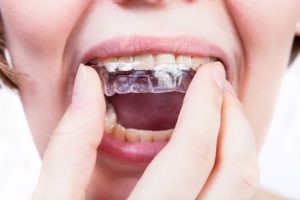Looking for a hard night guard to stop teeth grinding? You may need a personalised night guard for your teeth if you suffer from bruxism (teeth grinding). There are a variety of undesirable side effects from clenching or grinding your teeth while sleeping, including enamel loss and headaches.
A night guard is a barrier between your upper and lower arches that typically fits over your upper teeth. As a result, if you grind your teeth, they will be grinding against a much softer plastic than the enamel that covers your teeth’s surface.
There are one-size-fits-all night guards, night guard types that you can adjust to fit your bite, harder night guards that you can get custom-made for you, and hard dental night guards that you can purchase straight from the dentist.
In addition to the various fitting types, you also have the choice between different materials. Hard acrylic night guards and dual laminate night guards are some of the available options.
In this article, we’ll discuss the following:
- What are hard night guards?
- What are hard night guards made of?
- What are the best hard night guards for clenching and teeth grinding?
- Comparison of hard night guards vs. soft night guards
We hope that after reading this guide about hard dental night guards you can make the right decision for your specific needs.
What are hard night guards?

A hard night guard, also known as a nighttime mouth guard, is a dental device that fits over your teeth and prevents your top and bottom teeth from grinding or clenching at night. Certain individuals may require dental night guards throughout the day, but they are most often used at night when many people grind their teeth while sleeping.
Sleep disruption, morning headaches, jaw discomfort, and earaches are all signs that you grind your teeth at night. If you think you’re grinding your teeth at night, talk to your dentist about getting a harder night guard. Teeth grinding may cause enamel and tooth damage over time, leaving your teeth more sensitive and vulnerable to decay.
Different types of hard night guards

Depending on the brand you pick, you may be able to customise the fit of your night guard. The following are the various night guards for bruxism:
- One-size-fits-all: You may purchase over-the-counter mouth guards that are not custom-fitted. These are, undoubtedly, the most cost-effective solutions for the occasional teeth grinder.
- Boil and bite: To make your own impression, just boil it in water and bite into it. It’s typically straightforward to do and is inexpensive.
- Order online: You can order nightguards from the comfort of your own home. Just send your impression back to the company you ordered a kit from, and they will send you a night guard that fits perfectly.
- Night guards made in the dental lab: Mouth guards are available from your dentist. They provide the best possible fit because they are made in a lab using your impression.
It’s one thing to consider the many kinds of fitting types, but there are also a variety of materials and structures to choose from.
Dual laminate night guards
A dual laminate night guard is also a harder type of night guard. However, the interior of a dual lamination night guard is soft, while the exterior is firm, providing extra protection and durability.
It’s a good alternative if your teeth grinding is more severe and you’re looking for both maximum wearing comfort and durability.
Hard acrylic night guard
Another option is the hard acrylic night guard, also known as a hard plastic night guard. Hard acrylic is a much more durable material than other night guard materials. Acrylic is a transparent, rigid plastic substance.
This type is designed for people who grind their teeth often or severely. However, the acrylic night guard is not the same as an acrylic bite splint.
An acrylic biting splint is recommended for a patient to alleviate TMJ problems, while a standard hard acrylic night guard can help protect your teeth from damage through teeth grinding and clenching.
It is essential to get a custom night guard made with hard acrylic because it’s a stronger material. If you don’t get one custom made the night guard may not fit very well and cause your teeth to hurt and other problems.

How much does a hard night guard cost?
Your dentist will almost certainly recommend a harder night guard as a treatment option if you’ve been diagnosed with bruxism or TMJ disorder. So, how much will it cost you?
The cost of a harder night guard can vary greatly and it will most likely depend on the severity of your bruxism and where you’re buying it.
If you get a night guard on the NHS the cost will depend on which UK country that you live in. In England, a mouth guard or night guard could be classed as either a band 2 or band 3 treatment, depending on which type you need.
A band 2 treatment is £65.20 and a band 3 treatment is £282.80. However, you may be waiting quite a while as NHS waiting lists are longer than ever.
Custom night guards cost £50 to £100 from internet retailers, a night guard from a private dentist costs £150 to £350, and an over-the-counter night guard costs £15 to £25.
The quality and fit, on the other hand, differ substantially. An inexpensive night guard will not suffice if you’re a heavy tooth grinder. You’ll have to invest some money to get a high-quality night guard.
What are the hard night guard pros and cons?
|
|
Are harder night guards the right choice for you?
Harder night guards are almost always the better choice, while soft night guards are only recommended in certain circumstances. With softer guards, the bottom teeth tend to slip around easily. Furthermore, the soft ones may aggravate bruxism since the jaws naturally prefer to chew soft items.
Hard night guards vs. soft night guards
When comparing hard night guards vs soft night guards, there are benefits and drawbacks on both sides.
Hard night guards | Soft night guards |
Conclusion
You may still be unsure whether you should get soft or hard night guards. They both have some benefits and drawbacks. Unless you’re just grinding once in a while, hard night guards are usually the best option.
If you grind your teeth a lot or usually wear a retainer, you should always pick a hard night guard that is as durable as possible.
If you’re looking for a hard night guard that provides great comfort, while also giving you maximum durability because you grind your teeth a lot, we suggest you visit your dentist to get a hard night guard made for you.
sleepassociation.org: Night Guard for Bruxism: Teeth Grinding and Clenching. Consulted 25th July 2022




